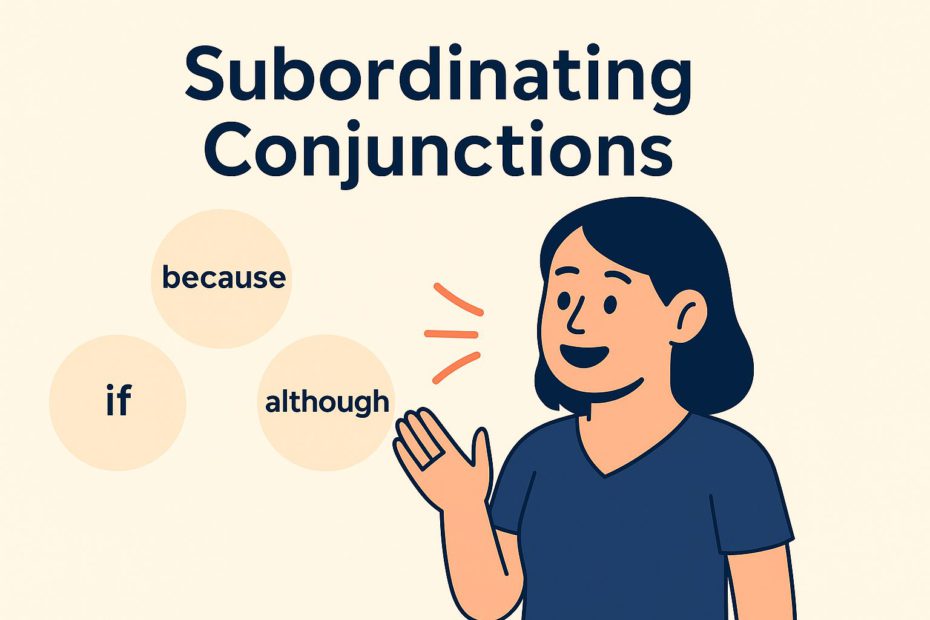In the world of English grammar, sentence structure is key to clear and effective communication. One important element that allows us to express complex ideas is the subordinating conjunction. These powerful words help connect ideas, add depth to your writing, and clarify relationships between different parts of a sentence.
Whether you’re a student learning grammar or a writer polishing your craft, understanding subordinating conjunctions is a valuable skill. Let’s explore what they are, how they function, and how to use them correctly in your writing.
🔹 What Is a Subordinating Conjunction?
A subordinating conjunction is a term used to link a dependent clause with a main clause, establishing a relationship between the two parts of the sentence. This connection establishes a relationship such as time, cause, condition, contrast, or purpose.
Example:
Although it was late, she continued working.
- “Although it was late” is a dependent clause—it cannot stand alone.
- “She continued working” stands as an independent clause because it delivers a full idea on its own.
- “Although” acts as the subordinating conjunction, linking the two clauses while highlighting a contrast between them.
🔹 Why Subordinating Conjunctions Matter
These conjunctions do more than just join clauses. They:
- Clarify how two ideas are related.
- Help you write complex, nuanced sentences.
- Improve the logical flow of your writing.
- Make your communication more professional and engaging.
🔹 Common Subordinating Conjunctions (By Category)
To better understand subordinating conjunctions, let’s organize them by the relationships they show.
🕒 Time
Indicate when something happens:
- After, before, as soon as, once, until, when, while, since
Example:
We’ll start the meeting after the manager arrives.
⚙️ Cause or Reason
Explain why something happens:
- Because, since, as, now that
Example:
She didn’t come because she was sick.
🔄 Condition
Show something depends on something else:
- You may attend the trip provided that you get parental permission.
Example:
You can borrow the car if you return it by 8 PM.
⚖️ Contrast or Concession
Highlight differences or exceptions:
- Although, though, even though, whereas, while
Example:
Even though it was snowing, the game continued.
🎯 Purpose
Explain the goal of an action:
- So that, in order that, lest
Example:
He studied all night so that he could pass the exam.
🔍 Comparison
Show similarities or differences:
- Than, rather than, as…as
Example:
She shows greater confidence now than in the past.
🔹 Sentence Structure with Subordinating Conjunctions
A subordinating conjunction introduces the dependent clause and links it to the main clause. This combination creates a complex sentence.
✅ Two possible placements:
- Dependent clause first (requires a comma): Because the roads were icy, school was canceled.
- Independent clause first (no comma needed): School was canceled because the roads were icy.
Both formats are correct. The placement may depend on emphasis or flow in your writing.
🔹 Dependent vs. Independent Clause: Quick Recap
- ✅ Independent clause: Complete sentence that can stand alone. She loves painting.
- ❌ Dependent clause: Incomplete thought, relies on a main clause. Although she loves painting…
When combined with a subordinating conjunction, the dependent clause adds meaning and clarity to the main clause.
🔹 Punctuation Rules
- Comma rule: Add a comma after a dependent clause if it appears at the beginning of the sentence.
Example: If it stops raining, the game will continue. - No comma: If the dependent clause comes after the main clause. We’ll go hiking if the weather improves.
🔹 Avoid These Common Mistakes
❌ Using Fragments
Incorrect: Because I forgot my homework.
Correct: I received a zero because I didn’t bring my homework.
❌ Comma Splice with Subordinating Conjunctions
Incorrect: I was tired, although I stayed up.
Correct: Although I was tired, I stayed up.
❌ Misplaced Conjunction
Incorrect: You will pass the test because study day and night.
Correct: You will pass the test because you study day and night.
🔹 Practice Sentences
Identify the subordinating conjunction in each:
- While she cooked dinner, he set the table.
- We’ll go for a walk unless it rains.
- He worked late so that the project could be finished on time.
- Since you asked, I’ll explain everything.
- She didn’t leave until the movie ended.
Answers:
- While
- Unless
- So that
- Since
- Until
🔹 Pro Tips for Using Subordinating Conjunctions
✔ Use them to show relationships between ideas clearly.
✔ Start sentences with them to add emphasis.
✔ Don’t overuse them—avoid long, tangled sentences.
✔ Always match them with complete clauses.
🔹 Final Thoughts
Subordinating conjunctions are vital tools for any English writer or speaker. They help express complex thoughts, link ideas smoothly, and clarify relationships between different parts of a sentence.
Mastering them will not only improve your grammar but also make your writing more mature, logical, and professional. So next time you write an essay, email, or article, try incorporating subordinating conjunctions to add richness and depth to your sentences.

